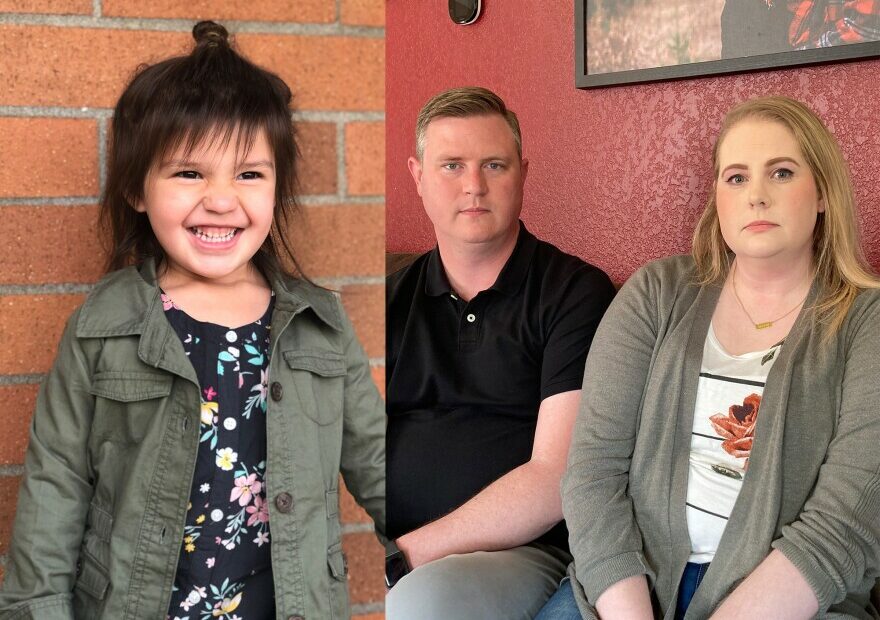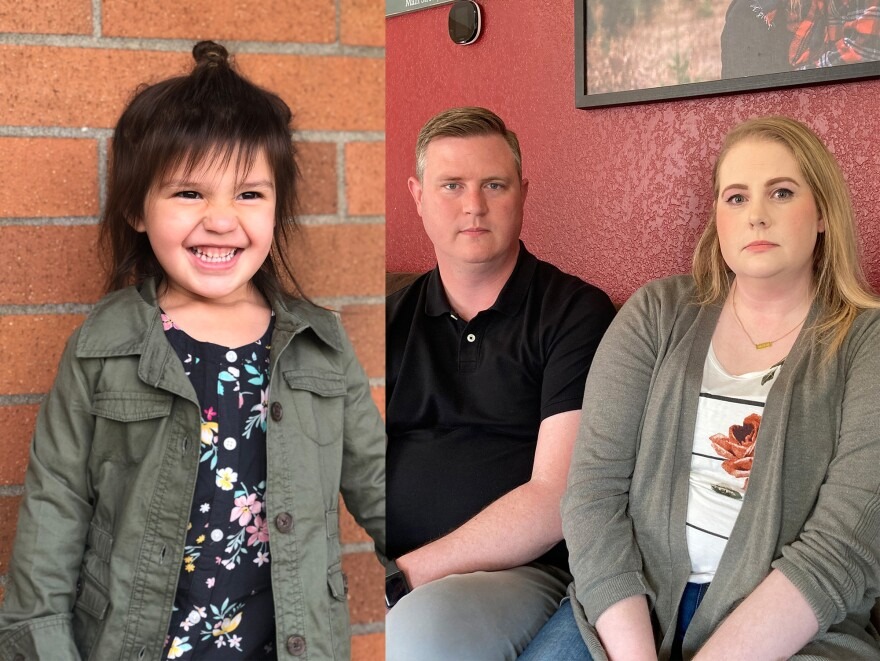In her tidy home on a cul-de-sac in Elma, Washington, Jamie Jo Hiles surrounds herself with photos of Oakley Carlson, her dark-haired, brown-eyed former foster daughter.
It’s been two-and-a-half years since Oakley left Hiles’ home and was reunited with her biological parents. And it’s been 15 months since Oakley was last seen alive.
The case of the missing 5-year-old from Grays Harbor County has garnered international media attention and drawn scrutiny to her parents who recently pleaded guilty and were sentenced for child endangerment involving their other children.
But the case has also raised questions about Washington’s child protective services system and whether it functioned as well as it should have in this case.
Oakley first came to live with Hiles and her husband Erik in August 2017, when she was about nine-months-old. For the Hiles, Oakley’s arrival in their lives was a dream come true. The couple had been trying unsuccessfully to get pregnant when one day Hiles, who teaches in the local schools, got a text from a former student asking if she’d be willing to foster Oakley. The couple didn’t hesitate, especially because they were under the impression they might ultimately be able to adopt her.
“It wasn’t something we sought out, but it worked out,” Hiles said.
Washington’s Department of Children Youth and Families (DCYF) has a goal of limiting the time a child is in foster care and finding a permanent home as quickly as is safely possible. But in Oakley’s case, months turned into a year, turned into two years. In the care of the Hiles, Oakley grew from an easy-going infant into an energetic toddler.
Photos and videos from this period depict holidays and memorable events: Halloween costumes, visits to the park and beach, goofy play around the house, snuggles on the couch and messy toddler meals.
But in November 2019, nearly 26 months after Oakley had come to live with them, the Hiles were suddenly notified that she was being reunited with her parents. Weeks later, on the day after Thanksgiving, that reunification happened. The Hiles were devastated.
“We cried, and then we went upstairs and we shut the door to our bedroom for months, probably six months. So, it was literally like a death,” Hiles said.
It’s not clear exactly what happened next. DCYF won’t comment on Oakley’s case citing state and federal privacy laws. The agency also denied a public records request by the Northwest News Network for information. But typically, a child welfare case is closed within six months of a child being returned to their biological parents — presuming the parents are complying with the conditions set by the courts. That six-month mark would have been reached around May 2020.
The last confirmed sighting of Oakley was nine months later, in February 2021. But Oakley wasn’t reported missing until months later — in December 2021, after a fire damaged the family’s home forcing them to temporarily relocate. That’s when a local school principal became concerned after talking with one of Oakley’s siblings.
On December 6, Oakley’s fifth birthday, police were sent out to do a welfare check. Det. Sgt. Paul Logan of the Grays Harbor County Sheriff’s Office said Oakley’s parents were uncooperative when asked about their daughter’s whereabouts.
“The responses to the fairly simple questions that were asked were met with hostility and answers that didn’t make any sense,” Logan said.
Oakley was declared missing and the sheriff’s office sought a search warrant for the family’s sprawling rural property near Oakville, Washington.
That search last December lasted several days and turned up evidence, but not Oakley or her body. Nonetheless, her parents — Andrew Carlson, a former Aberdeen police officer, and Jordan Bowers — were briefly held in jail on suspicion of manslaughter. While formal charges were never filed, the couple was later prosecuted for crimes related to their treatment of their other children.
This spring, both parents were sentenced after pleading guilty to child endangerment with a controlled substance for exposing their kids to methamphetamine.
Logan, the sheriff’s investigator, said the investigation into Oakley’s disappearance continues with the help of the FBI. At this point, he said, the assumption is she’s dead. Logan said investigators continue to work to gather the evidence they need to present a case to prosecutors.
“In this case, everyone’s concerned and everyone is looking at the situation like this is wrong,” Logan said. “But at the same time, there’s no law on the books for something just being wrong.”
Logan said he has no information on how DCYF handled Oakley’s child welfare case. However, Hiles is convinced the agency failed Oakley. She said the reunification in late 2019 felt rushed. She also questioned whether DCYF — in the midst of the COVID pandemic — adequately monitored the family after reunification, and whether the agency followed up when she reported additional concerns to caseworkers and Child Protective Services about Oakley.
“DCYF and the state of Washington, they should be sweating bullets because I know that once that information is public, I know that people are going to find out that they have completely dropped the ball,” Hiles said.
While DCYF won’t comment on specific cases, one of the agency’s strategic priorities is to reduce the number of children and youth in out-of-home care by half. When safely possible, the agency prioritizes reuniting children with their biological parents. If that’s not achievable, then DCYF will seek the termination of parental rights and identify another permanent placement, such as with next-of-kin or an adoptive family. The final decision on a placement rests with a judge who relies upon information provided by child welfare caseworkers.
In an interview on TVW’s “Inside Olympia” program last June, DCYF Secretary Ross Hunter noted that his agency was achieving its goal of reducing the number of youth in out-of-home placements.
“Big win,” Hunter said. “Even during this pandemic we’ve been able to continue driving down the number of kids in care and doing it safely. I’m excited about that.”
Complaints about DCYF are investigated by the Washington State Office of the Family and Children’s Ombuds. In an interview, Director Patrick Dowd said he’s aware of the Oakley Carlson case, but couldn’t confirm if his office is investigating how it was handled. Dowd explained that child welfare cases create a tension between the public’s desire for information and the family’s privacy.
“On one hand, you do want public confidence and trust in our state child welfare system,” Dowd said. “But we also want to be able to protect the families and the children that they serve.”
The Oakley Carlson case has led to community calls, and even a petition, for more oversight of families following reunification. State Rep. Tana Senn, a Democrat who chairs the Children Youth and Families Committee in the Washington House and serves on a DCYF oversight board, said she’s followed the case closely and talked with community members. But Senn isn’t convinced state law needs to be changed in response to what happened to Oakley. Instead, she expects if and when Oakley is formally declared dead there will be a formal child fatality review.
“I have no doubt that there will be an investigation to look at the case and see if mistakes were made, if processes need to change, if this was just a really unfortunate situation,” Senn said.
Senn added that it’s her understanding Oakley was reunited with her parents after they successfully completed a drug treatment program. The Northwest News Network couldn’t independently verify that report. Senn also noted the state budget this year funded additional resources for Grays Harbor County to help families with young children, especially those dealing with substance use disorders.
Meanwhile, Hiles has written to Gov. Jay Inslee asking him to order a review into the state’s handling of Oakley’s case. Inslee’s office declined to comment, citing state and federal privacy laws and the ongoing police investigation. Pressed on the matter, and specifically the question of accountability, a spokesperson for Inslee, Mike Faulk, responded via email: “Fine morning to cast aspersions.”
The Oakley Carlson case is not the first to raise questions about the state’s family reunification protocols. In 2010, following a case in which a foster family cared for a girl for four years before she was returned to her birth parents, then-Gov. Chris Gregoire “ordered a full external review of the child welfare system as it relates to this case,” according to reporting by KING 5 News.
Hiles said she’s concerned DCYF has become so focused on reunification of families that the agency has lost sight of its core mission. She added that she hopes something good can come out of Oakley’s case.
“I think that she can really save some kids’ lives,” Hiles said. “Hopefully DCYF can reform and really focus on what they are meant to do and that’s, you know, protecting children.”
Hiles also wants whoever’s responsible for Oakley’s disappearance to be held accountable.
To this day, framed photos of Oakley adorn Hiles’ home. They serve as reminders of the little girl with a big smile who she and her husband grew to love, and the two happy years she lived with them.

















